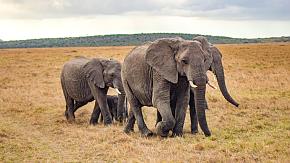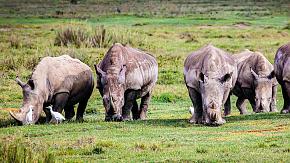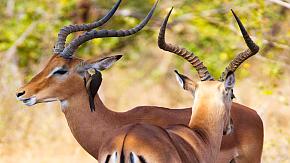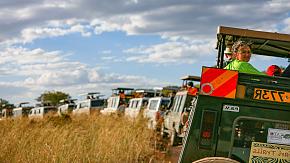Meet the Real Lion King in Africa
What is it about lions? Why do we human beings love them so much when they are among the most dangerous animals we could possibly encounter? I grew up watching Clarence, the Cross-Eyed Lion, and Born Free, the first fiction, the second based on the truth, and reading The Lion, the Witch and the Wardrobe by CS Lewis, still very popular after 70 years. Nature shows on television featuring lions are among the most popular.
Lion statues are found all over the world from London to China, neither of which has ever been home to lions. Singapore means "Lion City" despite never being home to lions. 17,000-year-old cave paintings in France depict lions.
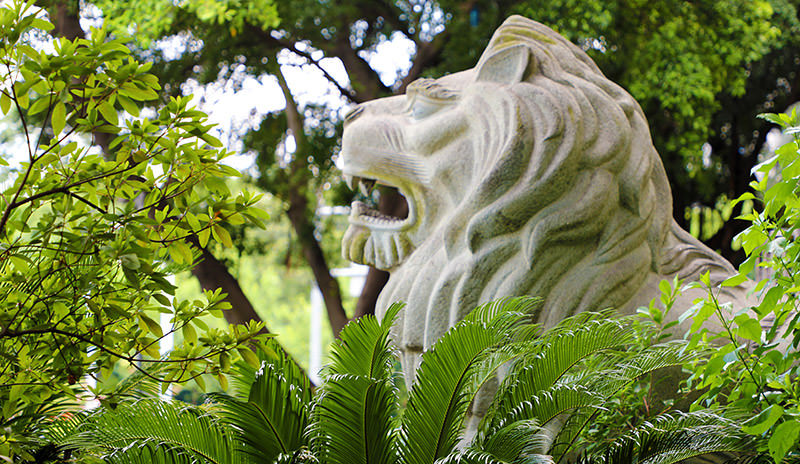 Lion statue, China
Lion statue, China
Now Disney has released an even more successful 2019 remake of its huge 1994 musical hit, the Lion King with its story heavily based on Shakespeare's Hamlet, one of the few plays he wrote that contains no mention of any lions!
Of course, like Shakespeare, few of us have actually ever seen a lion, other than behind bars, glass, or fences in a zoo or circus. Most have not seen one in the wild never mind a whole pride. But some of us have. So, if you or your kids are Lion King fans or just enthralled by lions, in general, why not tick off one from your bucket list and get up close and personal with real wild lions in their natural habitat?
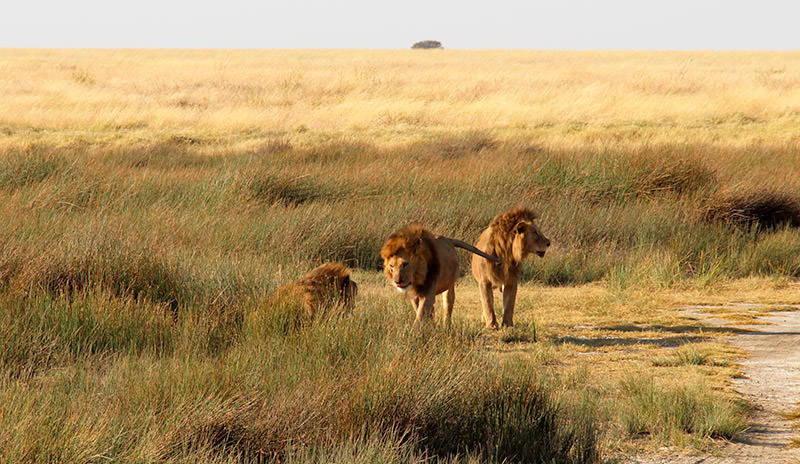 Wild lions in Serengeti National Park, Tanzania
Wild lions in Serengeti National Park, Tanzania
Africa is, of course, the only place to watch this king of animals at home, native populations elsewhere being extinct or very nearly so. So we are going to head to East Africa to find these magnificent beasts, but how do we find them? Simple. First, we need to find their food and they will follow. And their food is easy to find.
Like most people, I was brought up believing that the lion was the "King of the Jungle". There's only one problem with that. Lions don't live in jungles but on open plains, grasslands, and savannahs, for the simple reason that that is where their prey lives. By preference, lions will eat ungulates, the hoofed animals. Depending on location, these can be wildebeest, zebra, Thompson's gazelle, giraffe, Cape buffalo, etc. Most of the hunting is done by the females working in packs, but male lions also hunt, more often alone. The average lioness needs an average of 5 kg /11 lb of meat a day, whereas the larger males require 7 kg /15 lb. But this doesn't mean that they have to eat that amount every day. When they have a successful kill, they will gorge themselves, eating up to 30 kg / 66 lb at a sitting, then perhaps not eating for several days.
The problem for the lions is that their prey eats grass and with millions of the animals occupying their habitat, the grass soon runs out and they have to move on in search of new supplies. The lions have no choice but to follow. This has led to one of nature's most spectacular sights, as literally millions of animals migrate in a huge circle over the year, closely followed by the lions and other predators, including cheetahs, leopards, hyenas, and jackals. The grasslands of Tanzania and Kenya are home to over two million wildebeest, 250,000 zebra, half a million gazelle, and many other species.
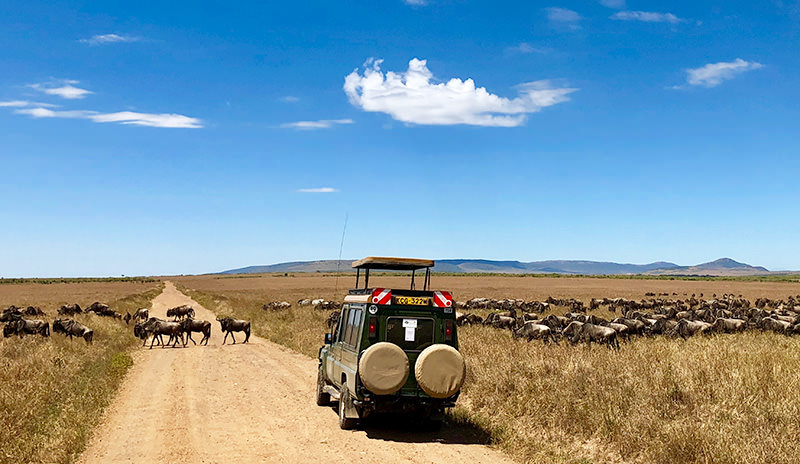 Seeing the wildebeests migration in Maasai Mara, Kenya
Seeing the wildebeests migration in Maasai Mara, Kenya
Between January and March, the ungulates' calving season, they are to be found in the Serengeti in Tanzania, where at that time of year the grass is lush. In only a couple of weeks the wildebeest population increases by half a million new calves! The other ungulates are equally prolific. By May and the start of the dry season, little grass that hasn't been eaten is beginning to dry out, so there is not enough food. Very sensibly, this huge crowd of animals decides to leave. The zebra head off first, traveling north-west, followed by the wildebeest, gazelle, and everyone else, including of course the area's 3,000 lions.
After about a month in the northwest they then face their greatest danger. Their route to new pastures requires crossing two rivers - the Grumeti and Mara rivers, both teeming with crocodiles who know they are coming! By early July, the animals have no choice but to take their chances on getting themselves and their offspring across the rivers and safely into the Masai Mara in Kenya.
They throw themselves into the waters frantically struggling to make it across, hoping that there is safety in numbers. Many don't make it. It is estimated that 250,000 wildebeest die on the migration; some from exhaustion or hunger, but many are taken by the carnivores following them and the crocodile waiting for them. Fatalities among the other migrants are equally high.
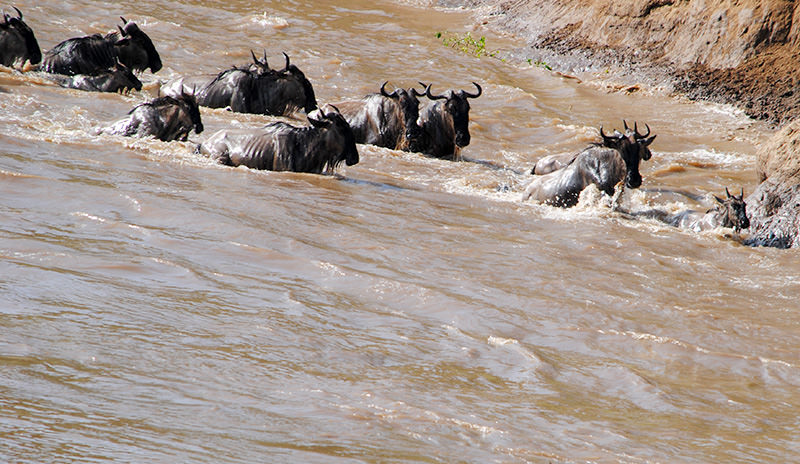 Wildebeests Crossing Mara River
Wildebeests Crossing Mara River
This river crossing, however gruesome, has become one of the most popular safari destinations in all of Africa. The sight of millions of animals braving the river, the crocodiles, and the lions is truly awesome to see. It is brutally beautiful and somehow humbling to witness.
Safely over the rivers, but still followed by the predators including the lions, the animals spend the rest of the summer in Kenya until the beginning of the rains in November, when they head south, arriving back where they started, in time for the new year's mating season. And the whole cycle restarts.
Much of the area of the great migration is today dedicated to national parks and safe safaris by 4x4 vehicles are available at all times of year. Lake Manyara National Park and Serengeti National Park in Tanzania all offer on-site accommodation and tours as do Lake Nakuru National Park and Masai Mara National Reserve in Kenya.
Although the Serengeti / Masa Marai area is perhaps the most well-known and spectacular, it is not the only place to see lions in Africa. For example, in South Africa, the Kruger National Park and the adjacent Sabi Sands are home to the so-called Big Five - lion, leopard, rhinoceros, elephant, and Cape buffalo. There are approximately 2000 lions and their prey. The park is also heavily populated by elephants, which the lions do not trouble! They are more interested in a nice dinner of giraffe, zebra, or buffalo. Unfortunately, this park still has a serious problem with poaching which the local authorities seem to have trouble preventing.
Of course, as you know, Africa has more than animals, so you can easily combine safaris with visits to some of the continent's many other attractions. In South Africa, who would want to miss Table Mountain? Or when in Tanzania, make a side trip to the spectacular Victoria Falls in neighboring Zambia?
SAFARI TIPS
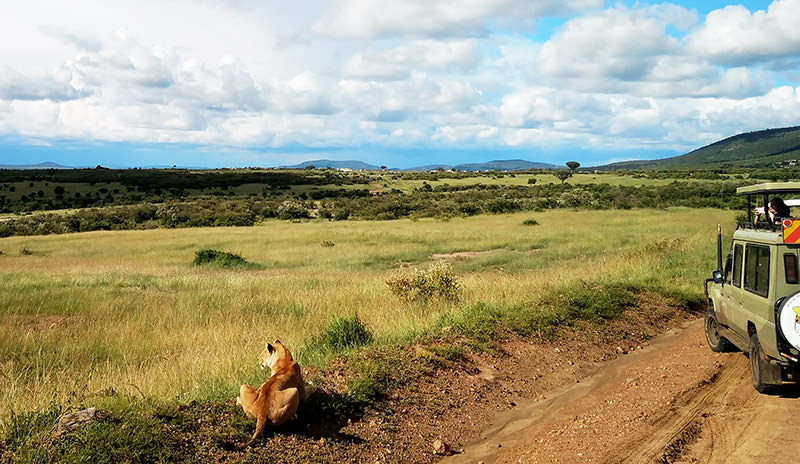 Seeing the real lion on a Maasai Mara safari, Kenya
Seeing the real lion on a Maasai Mara safari, Kenya
1. SAFETY
Accidents are rare, but happen very occasionally. Obey the park rules and always listen to and take your guides' advice. They know what they are doing and it's part of their job to see you leave safely, having had a great experience.
Never forget that you are among wild and very dangerous animals and it's their territory, not yours. I'm not only talking about the lions! Even peaceful-appearing vegetarians can do humans a lot of damage if they feel threatened. Never approach a nursing mother or her babies.
Never assume that a situation is safe because you can't see any animals. They are masters of camouflage and can move very quickly!
2. EQUIPMENT
I suggest you take as good a pair of binoculars as you can afford. Sometimes you will be close to the wildlife, but not always, Some are shy and many are wary of humans. If you are traveling with the kids, make sure they each have their own pair of binoculars. You don't want to spoil the trip with arguments about whose turn it is to use a shared pair.
Definitely take at least one camera to capture the magic you are going to see. Make sure you know how your camera works before you go! You don't want to miss the shot of your life while fumbling around trying to work out how to switch the thing on!
A digital SLR with long and wide-angle lenses is ideal, but expensive and heavy. Even smaller cameras can take great pictures if you know what you are doing. Take three times as many memory cards as you think you will need! And don't forget spare batteries or power banks to recharge.
Early morning is the best time for photographs. The light is perfect and the animals are more active. The harsh light at midday is never flattering and most animals are sensibly asleep! Early evening is a good second time as the animals wake up and head to water holes for a drink.
3. MOSQUITO REPELLENT
The most dangerous animal you are likely to encounter on an African safari is not the lion, but the mosquito. Carry and apply repellent (preferably DEET-based) at all times. They mostly bite at night, but apparently, some of them don't know that.
4. SUN PROTECTION
The sun can be intense. Protect yourself. Sunblock is essential as are sunglasses and a suitable hat.
5. CLOTHING
Don't forget that it can be extremely hot in the day, but bitterly cold at night. Carry enough clothes suitable for both extremes.
Don't wear new shoes! Wear comfortable, flat shoes. If you plan on any walking safaris, a pair of strong (but broken-in) safari boots would be a good idea.
6. MEDICAL KIT
A small, lightweight, basic medical kit is always good for emergencies.
But the most important thing to bring with you is your sense of adventure and wonder. Be prepared to be amazed and thrilled. By observing nature doing what it was doing long before we even turned up, you will come away with more than memories. You'll have a greater understanding and respect for the wonder of nature and our place within it.
Bring your children or the child within you to see something even more magical than Disney can even dream of. The real Lion King in all his terrible glory!
Don't forget Odynovo is here to organize a custom-made tour for you, your friends or family. Whether you want a safari tour or any other kind, let us know and we will design your own free, personalized itinerary to Africa or any of over 30 other destinations worldwide with no obligation on your part.
Quick Question
Related Posts You May Like
What Our Clients Say
Explore the latest verified reviews of Odynovo's travel services on Tripadvisor, Google, Trustpilot, Product Review and more trusted platforms.

